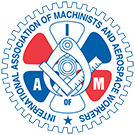Harnessing the Power of Independence
Laughing with a friend, a tall blonde visibly groped at her surroundings while attempting to ascend a flight of stairs at a posh, Los Angeles eatery. Witnessing the awkward-looking display, a fellow patron cast a disapproving glance and asked, “Liquid lunch?”

The icy words, uttered more than 20 years ago – but never forgotten – could not be further from the truth. The blonde woman, Lorri Bernson, is legally blind.
Bernson recalls the story from her office at Guide Dogs of America’s Sylmar, Calif., campus. It looks like the workspace of any other busy professional. A patchwork of supplies for an upcoming event loiters in the corner, a tower of files resides on her desk, and when her cell phone suddenly emits a cheerful sound, she reaches down to silence the device without missing a beat.
It often throws people. Like the businesswoman who, while on the phone with Bernson, once declared that she didn’t sound blind.
“I knew what she meant,” said Bernson. “I was probably supposed to sound a little more pathetic. I don’t sound like someone who has experienced this type of loss.” Society holds all sorts of misconceptions about people with disabilities.
Bernson first encountered vision problems in 1994, when diabetic retinopathy cast a cloudy haze over her right eye. Nearly 50 percent of those living with diabetes – both Type 1 and Type 2 – will experience some form of retinopathy. The condition often goes undiagnosed in its early stages when tiny blood vessels in the retina first begin to swell. As it progresses, the vessels hemorrhage, floating a cloudy haze or creating a “spotted” filter through which the person views the world. Various laser surgeries can oftentimes correct part of the vision loss, or slow its progression, but for many, legal blindness is the end result.
The progression is often gut-wrenchingly quick. Bernson continued to work in the licensing department at Paramount while undergoing a six-month period of assorted surgeries to try and correct the faltering vision in her right eye. Then, in a matter of seconds, her left eye began to take a similar path.
Another series of surgeries followed. “It was a roller coaster,” she said. “Am I going to be totally blind? Wait, I can see a little bit. No, I lost it…” The roller coaster of uncertainty lasted seven years. Bernson was left with zero vision in one eye and a hazy, pinhole’s worth of vision in the other.
Bernson initially settled into her blindness somewhat privately. She spent most of her time at home, enjoying books-on-tape and worshiping the sun like a true Southern Californian. “I hadn’t accepted the blindness to the point of wanting to use the white cane, because then you can’t fake it anymore,” Bernson said. “I mean, you can fake it pretty well if you want to… nonchalantly hold your friend and it doesn’t look that different – until you get to the restaurant and fork an empty bite into your mouth. That’s when people catch on.”
She eventually wanted more out of life. She began researching guide dogs, and realized one of the requirements for consideration was the ability to travel independently with a cane.
“For me, the cane was a means to an end,” Bernson said. “My last test of learning the cane was when my mobility and orientation instructor took me to an unfamiliar area, told me where the grocery store was, gave me a list of things she wanted and said, ‘I will meet you outside once you have the things I need.’ … It was scary, but I did it.”
“It was a test of using the cane, of independence, of being willing to ask a stranger for assistance… It was scary, but I did it,” Bernson said.”
Not long after, she was accepted to Guide Dogs of America as a student, and received her first guide dog, Nigel, in 2002.
“I had to learn how to trust a dog,” recalled Bernson. I’ve always been a ‘dog person,’ but never had to trust a dog with my life. It was emotional. It was difficult. It was exuberating. It was scary. But it was freedom – freedom to regain my independence. I needed that. I remember my mom saying, ‘It’s so good to see you walking tall again.’”
It’s a common transformation. Guide dog trainers often report watching students blossom from fearful and tentative to confident – even in unfamiliar surroundings – when in partnership with their highly skilled guides.
“When I received Nigel, everything changed in amazing wonderment,” said Bernson. “It was the difference between walking and always listening for danger, and being able to relax and enjoy the pleasant sounds around me because my dog is looking for possible danger.”
Having a guide dog offers more than just safety and independence. A dog is often the perfect ice-breaker.
“When you’re standing on the corner with a cane, nobody is going to talk to you,” said Bernson. “There’s no opportunity for eye contact and people are afraid. They don’t know what to say, so they don’t say anything. The minute I got a dog, we knew no strangers. It was like my social bridge to talking to people again.”
Many people find it odd, but Bernson says she’s truly happier now than when she was sighted.
“Knowing how I feel about myself now – that I did it – I didn’t let the blindness win; I’m beating it… that makes me happy. And it’s not about the little things anymore. I think any kind of significant loss puts things in perspective, and it’s a perspective that, when you really ‘get it,’ I think you’re happier.”
She is certain life with her guide dogs has had a tremendous impact on her overall attitude and positive outlook.
“I sometimes think about where I’d be if I hadn’t received a guide dog. Nowhere near where I am today, in a hugely negative way,” Bernson said. “I don’t think I would’ve risen above the loss to the point that I did.”
Pausing to stroke Carter’s soft, amber coat, she added, “People often ask, ‘Has he ever saved your life?’ and I know they’re looking for that unbelievable story where the scary thing was falling from the sky and he moved me away.”
But Bernson knows that’s not the point. Has having a guide dog ever saved her life? Every day.
# # #
Editor’s Note: A version of this story first appeared in the March 2013 issue of TRIBE Magazine.







